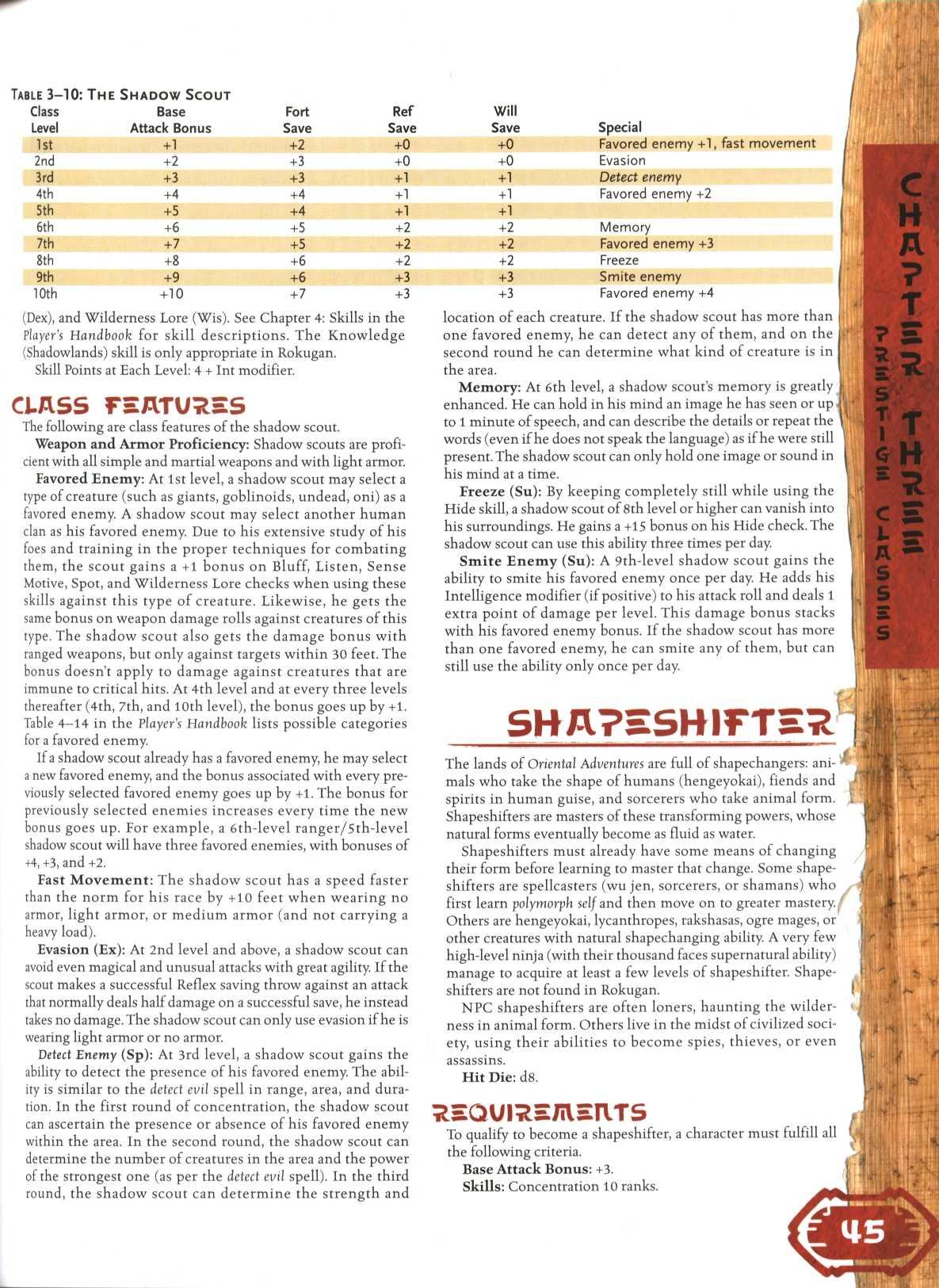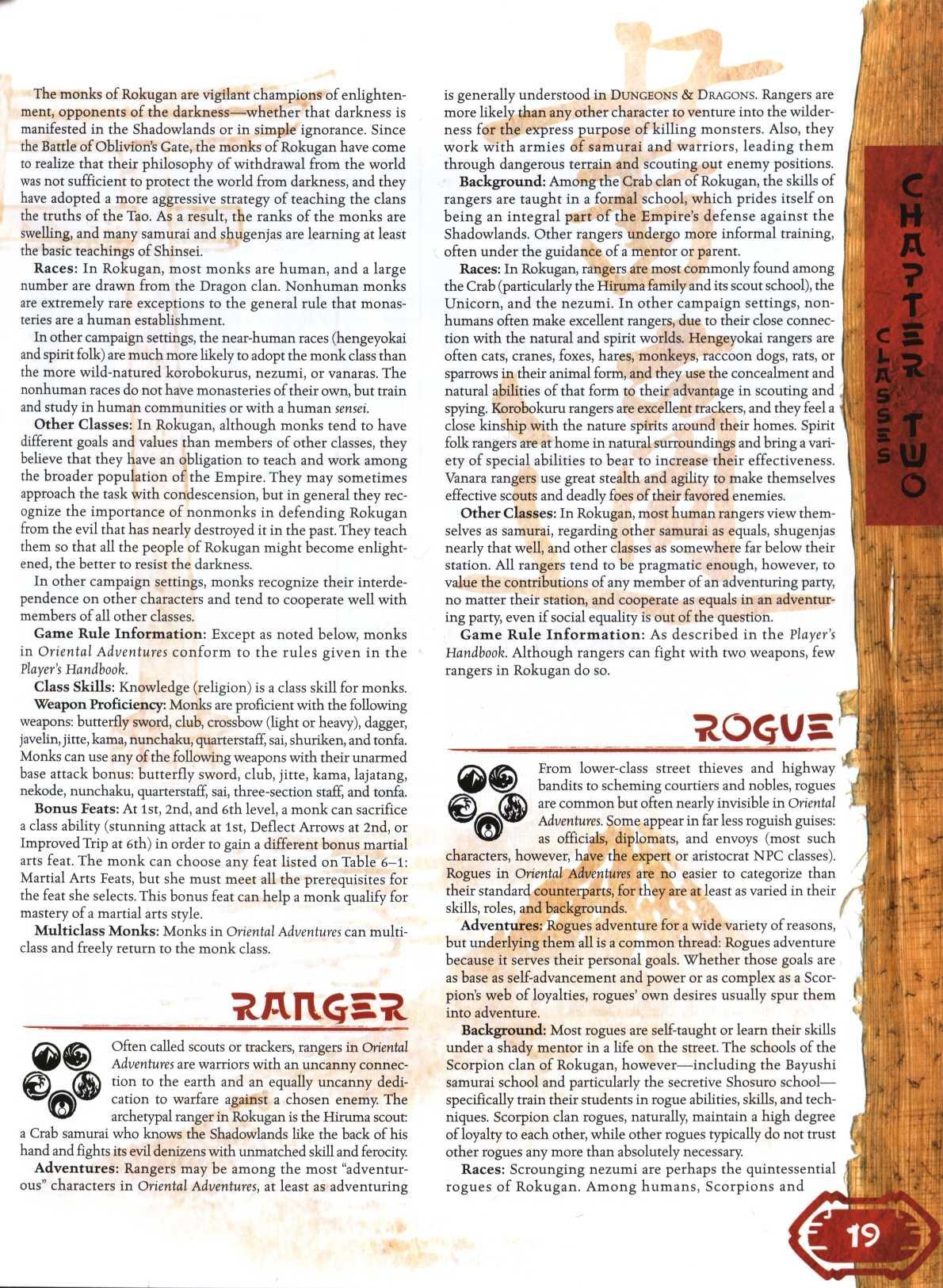lower-class peasants and outcasts are the most common rogues . Rogues are common among the races of the Shadowlands as well . In other campaign settings, hengeyokai rogues range from stealthy cat and rat burglars to brutish raccoon dog bandits. Spirit folk rogues are typically those who feel alienated from human society because of their spirit ancestry. Vanara rogues are not usually criminally inclined, but their limitless curiosity often gets them into trouble. Other Classes : Rogues prefer to be in control of any given situation. At one extreme, this manifests as a desire to make their own decisions and not be accountable to a leader figure . Rogues with this philosophy work well with anyone who does not try to boss them around . At the other extreme are rogues who seek to manipulate others to their own advantage. Given that preference, these rogues are happy to work with members of other classes-as long as those others can be tricked or coerced into doing what the rogue wants them to do . Fanatical devotees of bushido, like most samurai, can be a problem if they are too smart or strong-willed, and monks with their rigid ways of thinking are difficult to manipulate as well . In general, rogues enjoy working with rangers, ronins, and even barbarians . Game Rule Information: As described in the Player's Handbook, except as noted below. Weapon and Armor Proficiency: Rogues are proficient with the blowgun, crossbow (hand or light), dagger, punching dagger, dart, kama, light mace, ninja-to, nunchaku, composite shortbow, shortsword, tonfa, and wakizashi. Medium-size rogues are also proficient with the club, heavy crossbow, heavy mace, morningstar, and quarterstaff.
SAMURAI
Samurai are professional warriors, members of the noble class who are trained in the arts of warfare. They are not only trained for their role in society, they are born for it-born into a system of allegiance, loyalty, and honor that influences every stage of their lives. A samurai cut loose from this system is no longer a samurai; he is an ordinary fighter, a ronin with no honor and no standing in society. Adventures : A samurai's first responsibility is obedience to his lord, usually the head of his family. This is simultaneously an endless source of adventures and a potential hindrance to a life of adventure. A low-level samurai's lord may command him to investigate a mysterious occurrence or subdue a gang of bandits . If he performs these duties well, his lord will call on him to deal with more significant problems . However, a samurai usually cannot simply disappear on an expedition into the Shadowlands without his lord's command or at least permission, and if a samurai's lord has an important mission for him, he must make that his top priority. Whether this is a significant hindrance or not is up to the Dungeon Master. Characteristics : Samurai are distinguished from ordinary fighters by their adherence to bushido, a code of honor, loyalty, and obedience . They have combat training-including some bonus feats-rivaling that of a fighter. If a samurai remains honorable and true to his code of conduct, his swords-masterwork blades passed down through generations-may awaken in his hands, manifesting increasing magical abilities as the samurai advances in level and invests spiritual energy in them . To a samurai, dishonor is worse than death, and the loss of his swords is possibly the worst dishonor imaginable.
Alignment: Bushido, the code of the samurai, demands strict obedience to standards of behavior and honor. Only lawful characters can adhere to this code and call themselves samurai. Background : Samurai learn their combat techniques and the principles of bushido in established, well-organized schools. In Rokugan, at least one family is responsible for training samurai within each clan . The Crab's Hida school, the Crane's Daidoji and Kakita schools, the Dragon's Mirumoto school, the Lion's Akodo and Matsu schools, the Phoenix's Shiba school, the Scorpion's Bayushi school, and the Unicorn's Moto and Shinjo schools are the samurai schools of Rokugan. Races: Almost without exception, all samurai in Rokugan are humans from the major clans. In other campaign settings, only humans and spirit folk usually become samurai, because the samurai is very much a characteristic of human society. Other Classes: Samurai consider themselves the pinnacle of the Celestial Order that structures their society. Shugenjas are technically their equals in this order, but in a world where honor is virtually equated with battle prowess, shugenjas have a tenuous hold on that position . Samurai respect only other samurai-as well as other characters (Unicorn barbarians, Crab rangers) who wear the daisho and uphold the code of bushido. They are prone to treating members of other character classes as servants, or sidekicks at best, unless such characters are obviously well respected by the samurai's lord . TABLE 2-1 : THE SAMURAI
Level 1 st 2nd 3rd 4th 5th 6th 7th 8th 9th 10th 11th 12th 13th 14th 15th 16th 17th 18th 19th 20th
GAME
Base Fort Ref Will Attack Bonus Save Save Save Special +1 +2 +0 +2 Ancestral daisho +2 +3 +0 +3 Bonus feat +3 +3 +1 +3 +4 +4 +1 +4 Bonus +5 +4 +1 +4 +6/+1 +5 +2 +5 +7/+2 +2 +5 +5 Bonus feat +8/+3 +2 +6 +6 +9/+4 +6 +3 +6 +10/+5 +7 +7 Bonus +3 +11/+6/+1 +7 +3 +7 +12/+7/+2 +8 +4 +8 +13/+8/+3 +8 +4 +8 Bonus +14/+9/+4 +9 +4 +9 +15/+10/+5 +9 +5 +9 +16/+11/+6/+1 +10 +5 +10 Bonus +17/+12/+7/+2 +10 +5 +10 +18/+13/+8/+3 +11 +6 +11 +19/+14/+9/+4 +11 +6 +11 Bonus +20/+15/+10/+5 +12 +6 +12
RULE
INFORMATION
Samurai have the following game statistics . Abilities: Strength is especially important for samurai because it improves their melee attack and damage rolls. Constitution is important for giving samurai lots of hitpoints, which they'll need in their many battles. Dexterity is important for samurai who want to be skilled archers, improves theirArmor Class, and allows them access to certain Dexterity-oriented feats . Alignment: Any lawful . Hit Die: dio.
CLASS SKILLS A samurai's class skills (and the key ability for each skill) are Climb (Str), Craft (Int), Diplomacy (Cha), Iaijutsu Focus (Cha),






























